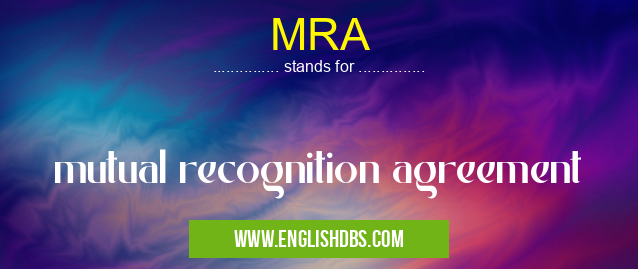What does MRA mean in LAW & LEGAL
MRA stands for Mutual Recognition Agreement, which is an agreement between two or more countries in which they acknowledge one another's standards of quality, safety, and other regulations for goods and services sold in either country. The purpose of the MRA is to reduce trade barriers by ensuring that products produced in one country that conform to the standards set out in the MRA will be accepted as conforming to the other countries’ standards. This essentially removes a major obstacle to international trade, allowing businesses from both countries to take advantage of free trade without having to undergo costly additional testing or certification processes.

MRA meaning in Law & Legal in Governmental
MRA mostly used in an acronym Law & Legal in Category Governmental that means mutual recognition agreement
Shorthand: MRA,
Full Form: mutual recognition agreement
For more information of "mutual recognition agreement", see the section below.
Benefits of an MRA
MRAs provide many benefits for both parties involved in the agreement. They allow businesses from different countries to engage in international trade without having to go through extensively testing and certifying their products according to multiple standards; this reduces time and costs associated with commercial transactions. In addition, because MRAs ensure that all participating nations adhere to a uniform standard of quality assurance, consumers can trust any product purchased within those nations knowing it meets acceptable safety requirements. MRAs also encourage technological advancements within industry since there are fewer restrictions on cross-border investments due to harmonized standards across borders. Lastly, MRAs help strengthen relationships between trading partners since they can rely on mutually agreed upon rules and collaboration when engaging in business activities with each other.
Essential Questions and Answers on mutual recognition agreement in "GOVERNMENTAL»LAW"
What is a Mutual Recognition Agreement (MRA)?
A Mutual Recognition Agreement (MRA) is an official agreement between two or more nations to recognize and accept each other’s professional qualifications, allowing professionals such as engineers, architects, auditors and accountants to practice their professions in another MRA partner country without taking additional tests or examinations. This agreement is intended to promote trade and cooperation between countries.
What are the benefits of having an MRA?
An MRA can serve as a catalyst for economic growth by facilitating business exchanges between different markets, allowing professionals to provide services beyond their home nation's market. It also helps create greater mobility for workers and increases competition due to the mutual recognition of qualifications. Additionally, it offers greater protection to consumers and businesses as they are protected from poor-quality services during transactions involving foreign partners.
How are MRAs negotiated?
MRAs are typically negotiated through bilateral or multilateral treaties between countries or organizations with similar goals and common regulatory regimes. This process generally involves discussing the scope of cooperation, committing to mutual recognition processes and determining the necessary regulatory requirements for successful implementation of the agreement. In some cases international organizations may be involved in formulating these agreements on behalf of governments.
What type of qualifications do MRAs cover?
Typically MRAs cover professional qualifications that involve complex skills such as engineering, architecture, auditing, accounting etc. Also certain educational degrees may be recognized under these agreements depending on the particular treaty language used in the agreement.
Is an MRA legally binding?
Yes, MRAs are legally binding agreements once they have been ratified by all parties involved in the negotiations.
Who enforces an MRA?
The enforcement of any MRA depends on the provisions included in each particular agreement. Generally speaking however enforcement is typically handled by relevant government agencies responsible for overseeing matters relating to professional accreditation.
How long does it take for an MRA to come into effect after being signed?
After it has been signed by all parties involved in the negotiations, an MRA will usually come into effect within a matter of weeks or months depending on how quickly both sides can ratify it.
Does a nation need special permission from other countries before entering into an MRA?
Not necessarily. However it can sometimes depend on the particular regulations governing agreements between nations within that particular region or trade bloc - so it is always advisable to check with a qualified advisor first before signing any such documents.
Final Words:
In conclusion, MRAs provide many benefits for countries looking to engage in international trade – they help reduce complexity involved with meeting multiple standards while still ensuring high-quality goods and services for consumers within participating countries. Through mutual recognition agreements countries can save money spent on compatibility testing while providing stronger assurances when conducting business activities across borders. Ultimately MRAs allow greater accessibility into global markets while promoting mutual trust among trading partners.
